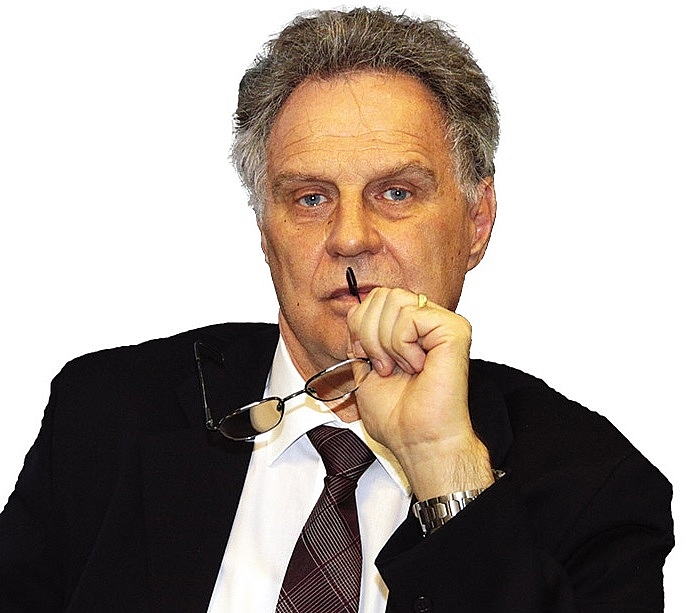Great progress towards eco-industrial parks
 |
| Heinz Leuenberger, professor of sustainable industrial development at the University of Applied Sciences and Arts, Northwestern Switzerland and UNIDO expert |
AS ONE OF THE EXPERT LEADERS EXECUTING THIS PROJECT IN VIETNAM, ARE YOU SATISFIED WITH THE RESULTS THE PROJECT HAS PRODUCED OVER THE PAST THREE YEARS?
We have made huge progress since 2016 and now is the time for us to review our achievements and draw lessons for the following phases. Now is also a good time for all related bodies of the Vietnamese authorities, industrial zones (IZs) management boards, and local people to discuss opportunities and challenges to transfer regular IZs into eco-industrial parks (IPs). In this process, closer and better co-ordination among related sides is required. In addition, the eco-IP model must be convincing in all aspects – environmental, social, and economical alike.
VIETNAM NOW HAS MORE THAN 330 IZS. HOW CAN THEY TRANSFER TO ECO-IPS AND WHAT CHALLENGES STAND IN THEIR WAY?
The first step is to convince the management boards of the IZs that they need this transformation.
Second, the management boards need to inform, convince, and motivate tenants that switching to the eco-IP model would not only protect the environment but bring great economic yields as well. Similarly, all investors who want to establish new IPs must also be convinced to go for the eco-IP model from the very beginning.
The management boards of existing IZs must raise awareness and consensus toward eco-IPs among their tenants because it does not make any sense for only a few tenants to go green.
Minimum participation is around 25 per cent of the tenants leasing space at a park.
HOW DOES UNIDO EVALUATE THE IMPLEMENTATION OF THE ECO-IP INITIATIVE SO FAR?
UNIDO is very happy with progress so far. First of all, we have achieved an extremely valuable result on the policy level by the Vietnamese government’s Decree No.82/2018ND-CP on regulating the management activities in industrial and economic zones, and ratifying the regulation on the management of eco-IPs in Vietnam.
Second, we have quite substantial results on assessing resource efficiency at the company level, an initiative conducted by Vietnam Cleaner Production Centre – an institution helping companies to save energy, water, and materials.
Our experiences in Vietnam show that all companies can in principle save 30-40 per cent of energy, up to 50 per cent of water, and 10-20 per cent of raw materials without sacrificing output.
Third, the project has managed to raise awareness among Vietnamese experts, authorities, and local people about the significance of eco-IPs.
Last but not least, private IZs in Vietnam have been highly supportive of our efforts to move them towards economic and environmental gains with eco-IPs.
We have seen great interest from the private sector, such as the DEEP C IZ cluster in the northern port city of Haiphong, VSIP in the southern province of Binh Duong, and Sonadezi in the southern province of Dong Nai.
What the stars mean:
★ Poor ★ ★ Promising ★★★ Good ★★★★ Very good ★★★★★ Exceptional
 Tag:
Tag:
Related Contents
Latest News
More News
- Sembcorp Development secures licence for VSIP in Khanh Hoa (December 31, 2025 | 18:54)
- Prodezi Long An advances towards integrated eco-centric industrial park model (December 26, 2025 | 11:16)
- Amata to develop $185 million Amata City Phu Tho (December 23, 2025 | 17:49)
- Work starts on Nhat Ban – Haiphong Industrial Zone Phase 2 (December 19, 2025 | 16:43)
- Becamex – Binh Phuoc drives sustainable industrial growth (November 28, 2025 | 15:22)
- South Korean investors seek clarity on IP lease extensions (November 24, 2025 | 17:48)
- CEO shares insights on Phu My 3 IP’s journey to green industrial growth (November 17, 2025 | 11:53)
- Business leaders give their views on ESG compliance in industrial parks (November 15, 2025 | 09:00)
- Industrial parks pivot to sustainable models amid rising ESG demands (November 14, 2025 | 11:00)
- Amata plans industrial park in Ho Chi Minh City (November 04, 2025 | 15:49)






















 Mobile Version
Mobile Version